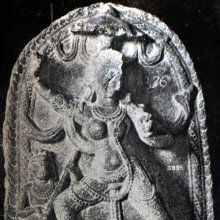Kra: 5 definitions
Introduction:
Kra means something in Hinduism, Sanskrit, biology. If you want to know the exact meaning, history, etymology or English translation of this term then check out the descriptions on this page. Add your comment or reference to a book if you want to contribute to this summary article.
Images (photo gallery)
Biology (plants and animals)
Source: Google Books: CRC World Dictionary (Regional names)1) Kra in Bangladesh is the name of a plant defined with Leea indica in various botanical sources. This page contains potential references in Ayurveda, modern medicine, and other folk traditions or local practices It has the synonym Aquilicia ottilis Gaertn. (among others).
2) Kra in Ghana is also identified with Dichrostachys cinerea It has the synonym Desmanthus nutans (Pers.) DC. (etc.).
Example references for further research on medicinal uses or toxicity (see latin names for full list):
· Flora de Filipinas, ed. 2 (1845)
· Boletim da Sociedade Broteriana (1965)
· Lingnan Science Journal (1935)
· Notulae ad Plantas Asiaticas (1854)
· Bulletin of Miscellaneous Information Kew (1926)
· Flora van Nederlandsch Indië (1859)
If you are looking for specific details regarding Kra, for example extract dosage, side effects, chemical composition, pregnancy safety, diet and recipes, health benefits, have a look at these references.

This sections includes definitions from the five kingdoms of living things: Animals, Plants, Fungi, Protists and Monera. It will include both the official binomial nomenclature (scientific names usually in Latin) as well as regional spellings and variants.
Languages of India and abroad
Sanskrit dictionary
Source: DDSA: The practical Sanskrit-English dictionaryKra (क्र).—1 U., 4. P. (krāmati, kramate, krāmyati, cakrāma, cakrame, akramīt, akrasta, krānta)
1) To walk, step, go; क्रामत्यनुदिते सूर्ये वाली व्यपगतक्लमः (krāmatyanudite sūrye vālī vyapagataklamaḥ) Rām.; गम्यमानं न तेनासीदगतं क्रामता पुरः (gamyamānaṃ na tenāsīdagataṃ krāmatā puraḥ) Bhaṭṭikāvya 8.2;25.
2) To go to, approach (with acc.).; देवा इमान् लोकानक्रमन्त (devā imān lokānakramanta) Śat. Br.
3) To pass or go over, go across, traverse; Uttararāmacarita 2.13; सुखं योजनपञ्चाशत्क्रमेयम् (sukhaṃ yojanapañcāśatkrameyam) Rām.
4) To leap, jump; क्रमं वबन्धं क्रमितुं सकोपः (kramaṃ vabandhaṃ kramituṃ sakopaḥ) (hariḥ) Bk. 2.9.5.51.
5) To go up, ascend; क्रामत्युच्चैर्भूभृतो यस्य तेजः (krāmatyuccairbhūbhṛto yasya tejaḥ) Śiśupālavadha 16.83.
6) (a) To cover, occupy, take possession of, fill; क्रान्ता यथा चेतसि विस्मयेन (krāntā yathā cetasi vismayena) R.14.17. (b) To reach up to, pervade, penetrate; क्रामद्भिर्घनपदवीमनेकसंख्यैः (krāmadbhirghanapadavīmanekasaṃkhyaiḥ) Kirātārjunīya 5.34.
7) To surpass, excel; स्थितः सर्वोन्नतेनोर्वीं क्रान्त्वा मेरुरिवात्मना (sthitaḥ sarvonnatenorvīṃ krāntvā merurivātmanā) R.1. 14.
8) To undertake, strive after, be able or competent for, show energy for (with dat. or inf.); व्याकरणाध्यय- नाय क्रमते (vyākaraṇādhyaya- nāya kramate) Sk; धर्माय क्रमते साधुः (dharmāya kramate sādhuḥ) Vop; व्युत्पत्तिरावर्जितकोविदापि न रञ्जनाय क्रमते जडानाम् (vyutpattirāvarjitakovidāpi na rañjanāya kramate jaḍānām) Vikr.1.16; हत्वा रक्षांसि लवितुमक्रमी- न्मारुतिः पुनः । अशोकवनिकामेव (hatvā rakṣāṃsi lavitumakramī- nmārutiḥ punaḥ | aśokavanikāmeva) Bhaṭṭikāvya 9.23.
9) To be developed or increased, to have full scope, be at home (with loc.); कृत्येषु क्रमन्ते (kṛtyeṣu kramante) Daśakumāracarita 17; क्रमन्तेऽस्मिञ्शास्त्राणि (kramante'smiñśāstrāṇi), or ऋक्षु क्रमते बुद्धिः (ṛkṣu kramate buddhiḥ) Sk. क्रममाणोऽरिसंसदि (kramamāṇo'risaṃsadi) Bhaṭṭikāvya 8.22.
1) To succeed, have effect (Atm.); न चक्रमस्याक्रमताधिकं धरम् (na cakramasyākramatādhikaṃ dharam) Śiśupālavadha 1.54.
11) To be repeated (as a letter or word in the arrangement called krama q. v.)
12) To fulfil, accomplish.
13) To have sexual intercourse with; to cover (in copulation); क्रमस्पर्श इव रोहितमनवग्लायता सदा (kramasparśa iva rohitamanavaglāyatā sadā) Av.4.4.7. (By vṛttisargatāyaneṣu kramaḥ P.I.3.38; kram by itself is used in the Ātm. in the sense of 'continuity' or 'want of interruption', 'energy or application', and 'development or increase', and also 'conquering or getting over.) -Caus. (kramayati, krāmayati)
1) To cause to go &c.
2) To repeat a letter (as in the krama arrangement). -Desid. चिक्रमिषति, चिक्रंसते (cikramiṣati, cikraṃsate) &c.
Derivable forms: kram (क्रम्).
Source: Cologne Digital Sanskrit Dictionaries: Monier-Williams Sanskrit-English Dictionary1) Krā (क्रा):—[from kram] a See udadhi-
2) [v.s. ...] dadhiand rudhi-krā.
3) b See √kram.
[Sanskrit to German]
Sanskrit, also spelled संस्कृतम् (saṃskṛtam), is an ancient language of India commonly seen as the grandmother of the Indo-European language family (even English!). Closely allied with Prakrit and Pali, Sanskrit is more exhaustive in both grammar and terms and has the most extensive collection of literature in the world, greatly surpassing its sister-languages Greek and Latin.
See also (Relevant definitions)
Starts with (+694): Kra bia luenag, Kra chaai, Kra don, Kra don bok, Kra el rab, Kra lekrab, Kra ma kap, Kra mra sa, Kra niang, Kra niat, Kra phaak laak, Kra thong laai, Kra-bobo, Kra-sai-kui, Kra-thang, Kra-thang syndat, Kraaibessie, Kraaihout, Kraaiknoffel, Kraakstewel.
Ends with (+658): Aakra, Abhikra, Abhimataphalacakra, Abjacakra, Acakra, Achakra, Adharacakra, Adharachakra, Adhicakra, Adhikra, Adhyakra, Advayacakra, Advayavakra, Agnicakra, Agnichakra, Agninakra, Ahibalacakra, Ahicakra, Ahichakra, Aindracakra.
Full-text (+616): Avakra, Nakra, Vakra, Kama, Cukra, Udadhikra, Ekacakra, Ativakra, Udadhikras, Dharmacakra, Sthiracakra, Prithivishakra, Rashicakra, Acakra, Dimbhacakra, Takra, Ajnacakra, Cakra, Dadhikra, Anuvakra.
Relevant text
Search found 23 books and stories containing Kra, Krā; (plurals include: Kras, Krās). You can also click to the full overview containing English textual excerpts. Below are direct links for the most relevant articles:
The Skanda Purana (by G. V. Tagare)
Chapter 62 - The Practice of Mahāvidyā < [Section 2 - Kaumārikā-khaṇḍa]
Chapter 3 - Queries Made by Devī < [Section 1 - Prabhāsa-kṣetra-māhātmya]
Rig Veda (translation and commentary) (by H. H. Wilson)
Atharvaveda and Charaka Samhita (by Laxmi Maji)
Treatment of Bhagandara (fistula in the anus) < [Chapter 3 - Diseases and Remedial measures (described in Atharvaveda)]
The Indian Buddhist Iconography (by Benoytosh Bhattachacharyya)
Vasudevavijaya of Vasudeva (Study) (by Sajitha. A)
The Mode of Illustration of Rules < [Chapter 3 - Vāsudevavijaya—A Grammatical Study]
Tibet (Myth, Religion and History) (by Tsewang Gyalpo Arya)
4. How Bon spread to Tibet < [Chapter 6 - Tonpa Shenrab Mibo and Bon Religion]
3. Early Zhangzhung Kings < [Chapter 2 - Zhangzhung Civilization]
1. Tibetan Alphabet < [Chapter 5 - Tibetan Language and Writing System]

